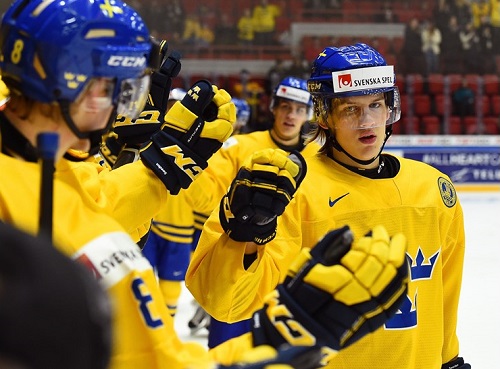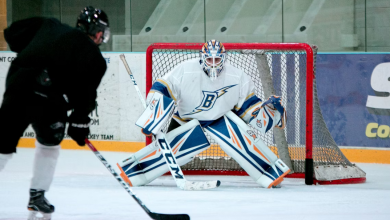Sweden clinches Group A with win over Denmark at the 2016 World Junior Championships

After blanking the United States on Monday, Sweden continued their impressive start to the 2016 World Juniors with their third win, this time against Denmark.
Sweden switched up netminders for this contest, after a 46 save shutout against the US, Islanders prospect Linus Soderstom watched on from the bench as Flyers third round pick in 2015 Felix Sandstrom got the start for his first appearance in the tournament.
It didn’t take long for the Swedes to get on the board, just 13 seconds in a turnover set up LA Kings prospect Adrian Kempe to fire a wrist shot past Danish goalie Thomas Lillie to make it a 1 – 0 lead early on.
Sweden continued to dominate possession and shots but didn’t get many quality chances to add another on the scoreboard until Alex True was given a four-minute penalty, two minutes for holding and two minutes for roughing, putting the Swedes on an extended powerplay.
The first minute went by without much in the way of a threatening opportunity, but with the puck played around the blue line Jakob Forsbacka Karlsson played the puck back to Gustav Forsling who fired a hard slapshot through traffic and into the back of the net for a 2 – 0 lead that stuck until the end of the first period.
Forsling, originally a Canucks draft pick but now a Blackhawks prospect missed the first game of the tournament but has been impressive since coming back, last year the 6’0” defenseman led all blue liners in the tournament with 8 points including three goals.
Sweden continued to dominate early in the second, holding the Danes in their own zone for extended periods of time thanks to some exceptional puck security from forwards like Axel Holmstrom but they couldn’t solve Danish goalie Thomas Lillie who was exceptional all throughout the second period.
As the Swedish shot totals increased the frustration mounted as the score remained the same, Sweden could’ve got their third late in the second after Axel Holmstrom’s pass in front to Oskar Lindblom who’s shot met the paddle of Lillie’s stick who was committing daylight robbery on the Swedish forwards, stopping 21 shots in the second period alone.
Lindblom got revenge after being robbed minutes before, after the puck bounced off a broken Danish stick favorably to Adam Ollas Mattsson, his wrist shot was tipped by Lindblom and past Lillie to make it 3 – 0 game at the end of the second, but had it not been for Lillie who plays in the Vaxjo Lakers system in Sweden, the Swedes could’ve easily put the game to bed in the second period.
Sweden took the 3 – 0 lead into the third period where it was more of the same, Sweden dominated the possession and Thomas Lillie pulled off the saves, that was until the midway point of the period when William Lagesson fired a wicked wrist shot over the shoulder of Lillie to give Sweden a 4 – 0 lead.
Lagesson’s goal made him the 11th Swede to score in the tournament as his goal was their 12th of their 2016 campaign, the only player who’d scored twice was Dmytro Timashov who scored two in their opening game win against Switzerland.
Timashov was joined with two goals as two draft eligible players linked up late in the period, Rasmus Asplund held possession in the corner, finding Alex Nylander in front of net who quickly pulled the puck to his back hand, lifting it past Thomas Lillie to give Sweden a 5 – 0 lead with his second goal of the tournament.
It looked as though the Swedes had added a sixth as Jakob Forsbacka Karlsson was alone in front, tapping the puck seemingly past Lillie who had other plans as he made his glove save look effortless to keep it a 5 – 0 game when the final buzzer sounded.
Sweden could’ve had a bigger win after their 48 shot performance, while Swedish goalie Felix Sandstrom had an easy afternoon, stopping the only 8 shots he faced on his way to a shutout.
With the win, Sweden made it 9 straight years where the sealed the top spot in their group, with 9 points and a win over the US under their belt, even if the United States defeat Switzerland and Denmark, they’ll lose the head to head if they end up tied with Sweden when the group stage closes tomorrow.
With three wins in three games, Sweden now has 35 straight wins in the group stage, a record that started on December 28 2006 in a 6 – 3 win over Slovakia following an opening day loss to Canada in the 2007 World Juniors, Sweden will face the Canadians tomorrow night to close out their group stage heading into the new year.

